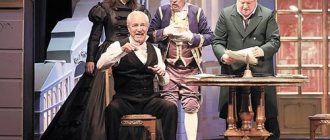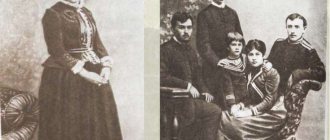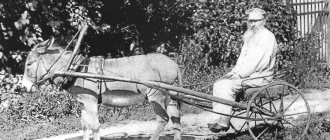Ostrovsky Alexander - Poverty is not a vice
And this allows us to become better and wiser. How to distinguish real wealth, eternal wealth from useless and disgusting wealth. And despite the depth of the play, it is written in the comedy genre, and therefore it is pleasant and easy to listen to. The comedy is written in three acts. The first action finds us in the room of the young clerk Mitya, who faithfully serves Gordey Karpych Tortsov, a rich merchant. After a conversation with Yegorushka, Mitya is left alone and it is clear from everything that he has sadness and melancholy in his heart. And they are caused by warm feelings for the young and beautiful daughter of the merchant - Lyubov Gordeevna.
After the festivities, the whole Tortsov family returns home and first the kind Pelageya Egorovna comes to Mitya and invites Mitya to tea. After this, young people - girls and boys - come to him. Among them is Lyubov Gordeevna. Mitya manages to be alone with her beloved and whisper a few tender words in her ear, which does not go unnoticed by her girlfriends and boys.
After the youth leave, Lyubima Karpych, Gordey Tortsov’s brother, comes to Mitya and tells the story of her life. Having received an inheritance from his father, he, unlike his brother, did not go into business, but left for Moscow. There he spent all his money in taverns, theaters, and shops. He returned with nothing and is now forced to live in poverty and listen to the reproaches of his brother.
In the second act, listeners are transported to the living room of the Tortsovs’ house. Here Pelageya Egorovna gathers the young people and the real festivities begin. At this time, Gordey Karpych returns with his new comrade, Korshunov. This old, depraved rich man loves honor and is after young girls. In front of the capital's guest, the owner of the house tries to show his education and sophistication, but it turns out to be ridiculous and feigned.
During his visit to the Tortsovs, Korshunov pays strong attention to the young daughter of Gordey Tortsov. And at the same time, from the conversation it becomes clear that the father has already promised to give his daughter as a wife to the visiting rich man. He sees his daughter’s happiness in the fact that she will live like a lady, ride in carriages, and visit salons. He does not understand that living with an unlovable, old husband will be joyless for Lyuba. Moreover, before this she had already explained herself to Mitya and opened her heart to him. The young couple intended to get married.
The character of Lyubov Gordeevna deserves respect. Even when the father announced his decision to give his daughter to Korshunov, she did not dare to go against her parents’ will. Neither Mitya's tears nor her own suffering could overcome what was decent and responsible in her. The girl accepted her father's decision with mournful resignation.
In the third act, the listeners find themselves in Pelageya Egorovna’s office. A woman is busy preparing for a wedding. She understands that she is giving her daughter to someone she doesn’t love, but she also doesn’t want to contradict her husband’s will. Mitya decides to leave the Tortsovs’ house to stay with her sick mother. As he says goodbye, he tries for the last time to persuade Lyubov to run away with him, but the girl is unshakable. Her father's will is more important to her than her own happiness.
During the farewell of the newlyweds, Gordey Karpych and Korshunov enter the room. At this time, Lyubim Karpych appears, who accuses Korshunov of dishonesty. It was he who robbed Lyubim Karpych in Moscow many years ago. In anger, Korshunov leaves the Tortsovs’ house, insulting both Gordey and Lyuba at parting.
Proud Tortsov, seeing Korshunov’s true face, did not want to give Love for him. And at this time Mitya opened his feelings and asked for his father’s blessing out of love. Lyubim took the side of the young people, convincing his brother that poverty is not a vice, but a pure heart is much more important than money. Touched Gordey Karpych blesses his daughter and Mitya.
The audiobook was narrated by narrator Stanislav Ivanov, who is not the first time to delight listeners with high-quality performances of classical works. Stanislav succeeded in every character, including the female roles. Listening to an audiobook is pleasant thanks to the work of Stanislav Ivanov, and useful thanks to the talent of A.N. Ostrovsky.
Poverty is not a vice
The tale of a treacherous manufacturer and a kind uncle
How long before sin, without asking the mind-mind
I haven't read a play like this for a long time. To be precise, since school itself. And not because I don’t like them, but somehow I just didn’t get my hands on them. Although, I remember, at school I was always happy when I saw an excerpt from a play in a textbook - it was always interesting to read such a form, even if the content did not go entirely smoothly.
I must say that I know Ostrovsky very superficially. That is, of course, I read “The Thunderstorm” and “Dowry” according to the program, but this was the case when the reading was “forced”, I was not in the mood for it at that time. And if I later became acquainted with “The Dowry” at least from the film “Cruel Romance,” then “The Thunderstorm” was completely and irrevocably lost somewhere in the depths of my memory to such an extent that I don’t even remember what the essence was. This will need to be corrected when the opportunity arises.
"Poverty is not a vice"
- this is my attempt to reacquaint myself with the author.
Apparently, not the best choice. Everything suggests that this play is lighter and even in some sense fabulous than Ostrovsky’s other works, despite the fact that the situation in it is played out in the most realistic and everyday way
. It’s just resolved somehow too easily and unobtrusively. Everyone is happy and contented, right down to the most minor characters.
As for the language, it simply evokes an irresistible desire to write everything down
. There, every phrase is a saying. This is especially true for “uncle” Lyubim Karpych - he speaks so smoothly, almost in verse, on any topic that you are simply amazed. I think he had no reason to complain about life; with such talent he wouldn’t have disappeared on the street, that’s for sure.
As for the main conflict, it is classically simple. There is a rich merchant who intends to become related to a large manufacturer, there is his daughter in love with a young poor clerk, there is this clerk himself, in love with the owner’s daughter. The question is simple: will the beautiful Lyubov Gordeevna be given away for the “old and hateful” or will love and justice triumph?
A little off-topic.
What surprised me in the first act of the play was that all the people crowded into the clerk’s room.
This is not a room, but just some kind of passageway: either the hostess will come in to cry about her bitter fate, then the owner’s nephew will come in for a heart-to-heart talk, or the girls will wander in because they are bored of sitting alone. Or the whole crowd will collapse, led by the owner, although the room seems to be declared as “small”. All this, of course, is fully explained by the fact that the clerk Mitya is a kind of “soul of the house”, he will find a kind word and a couple of coins for everyone, although he himself doesn’t have much, so everyone is drawn to him. But still, this total pilgrimage to his room seemed a little strange to me. Our heroes are different. Mitya
, having made sure that he is reciprocated, he is ready to act: at least take the bride away secretly, at least go to her parents to bow, just not sit idly by, but do something.
Lyubov Gordeevna
, as well as her mother, on the contrary, personify submissive submission to fate.
If this is the will of the father, then it must be so
. It’s not that they have any special choice - times are not the same - but they have no desire to change anything. But I live according to the law, and in general, this has been the case from time immemorial.
It is curious that Lyuba’s love (it was necessary to choose this particular name for the heroine) stems mostly from pity:
It hurts my heart, so quiet and lonely.
That is, she didn’t seem to notice his other qualities, but the fact that he looks “through the eyes of a sick dog,” dresses poorly and endures reproaches from his daddy, melted the girl’s heart. However, what difference does it make what exactly melted, the main thing is that she also sees everything else over time, since the author was so kind as to give her such a chance.
The play perfectly satirizes the morals of society, stupidity and ignorance, the thoughtless desire to follow fashion, and disregard for others.
A lot of everyday details fit into the pages: mummers, songs, dances, Christmas fortune-telling. This is all wonderful, but the plot and characters still seemed to me unfinished, and in some places even forced. Especially in the final scene, which clearly smacks of absurdity, even if we remember that the action takes place on Christmastide, when all sorts of miracles are possible. Any kind of miracles, but I find it hard to believe that people like Gordey Karpych can suddenly have a heart.
Bottom line
. So far, my re-acquaintance with Ostrovsky has not gone very well, although overall I appreciated the play quite well. But I hope that I just chose the wrong piece. I still plan to read “A Profitable Place” and really hope that I will have better luck with it.
Read as part of the Hopscotch Game
, 6th round (extended version)
Characters
Gordey Karpych Tortsov , wealthy merchant. Pelageya Egorovna , his wife. Lyubov Gordeevna , their daughter. We love Karpych Tortsov , his brother, who wasted money. African Savich Korshunov , manufacturer. Mitya , Tortsov's clerk. Yasha Guslin , Tortsov's nephew. Grisha Razlyulyaev , a young merchant, the son of a rich father. Anna Ivanovna , young widow. Masha; Lisa , friend of Lyubov Gordeevna. Egorushka, a boy , is a distant relative of Tortsov. Arina , Lyubov Gordeevna's nanny. Guests , guests, servants, mummers and others.
The action takes place in a provincial town, in the house of the merchant Tortsov, during Christmastide.
Poverty is not a vice summary
The play “Poverty is not a vice” by Ostrovsky was written in 1853 and initially had a different title – “God Resists the Proud.” According to the writer's plan, the play was written to ridicule the ridiculous fashion for Western trends in the way of life of the Russian merchants. To better prepare for a literature lesson, we recommend reading an online summary of the actions .
The main characters are Gordey Karpych Tortsov - a rich merchant who decided to change his usual way of life in a Western manner. Afrikan Savich Korshunov is a wealthy Moscow manufacturer, confident that money can buy everything, including love. Mitya is Tortsov’s clerk, a decent young man with a soft heart. Lyubov Gordeevna is Tortsov’s daughter, an intelligent and modest girl, raised in a patriarchal spirit. Other characters We love Karpych Tortsov - the brother of Gordey Karpych, a simple and simple-minded person. Pelageya Egorovna is the wife of Gordey Karpych, a woman of the old school. Yasha Guslin is a young man, a distant relative of Tortsov, in love with Anna Ivanovna. Anna Ivanovna is a young widow, a lively and cheerful woman. Grisha Razlyulyaev is the son of a rich merchant, a carefree young man. Summary
Act one The clerk Mitya learns from Yegorushka that his master, Gordey Karpych Tortsov, is very angry with his brother. Having gotten drunk at the holiday, Lyubim Karpych “began to throw out different knees” in front of the guests, which deeply offended his brother. After some time, the owner’s wife, Pelageya Egorovna, arrives, as well as their daughter, Lyubov Gordeevna. Tortsova complains to Mitya about her husband, who got involved with Afrikan Savich Korshunov. Friendship with a wealthy Moscow manufacturer, an avid Englishman, seriously influenced Gordey Karpych - “now everything Russian is not nice to him.” Pelageya Egorovna worries about the fate of her daughter, who is about to get married, but her husband keeps saying that “she has no equal.” Apparently, he plans to arrange Lyubochka’s fate in Moscow. In a private conversation, Mitya complains to Guslin about Gordey Karpych, who “reproaches everything with poverty,” but does not increase his salary, despite all the efforts of his young clerk. But the worst thing is that Mitya dared to fall in love with the merchant’s daughter, Lyubov Gordeevna. Guslin advises his friend to put it out of his head, because “it will be even harder later.” Meanwhile, friends of the merchant’s daughter come to the Tortsovs. The young merchant Grisha Razlyulyaev amuses the girls, and soon the guests start dancing and singing funny songs. Unnoticed, the guys and girls leave the room, and Anna Ivanovna locks it, leaving Lyubov Gordeevna and Mitya alone. The young man understands that there will be no better moment to declare his love, and reads poems of his own composition to Lyuba. The girl writes him a response and asks him to read it only after she leaves.
Act two Mitya finds Lyubov Gordeevna and asks to confirm the authenticity of the words she wrote. If Mitya is “accepted in ridicule” by the merchant’s daughter, then he will not live in this world. Lyubov Gordeevna confesses her love to him, and the young people decide to go the next day to Gordey Karpych and ask for his father's blessing. Pelageya Egorovna calls the neighboring girls. Lyubov Gordeevna and her friends, Anna Ivanovna, Yasha Guslin, Mitya, Razlyulyaev gather in the Tortsovs’ house, and soon the fun begins. The hospitable hostess treats the young people with sweets and wine - she enjoys watching the songs and dances of the young people. However, the fun quickly fades when the owner appears in the house along with Korshunov. Gordey Karpych is extremely dissatisfied with the fact that his wife organized a Christmas party “in a peasant manner.” He orders the servants to light candles and bring champagne, and invites the capital’s guest to go into the living room, where “there will be a completely different effect.”
Meanwhile, Korshunov admires the girls and offers to kiss in honor of the holiday, since he is “a hunter for this.” Left alone with Lyubov Gordeevna, Afrikan Savich presents her with diamond earrings as a gift and asks her to love him, because he is a good, cheerful person, and, most importantly, not poor. Gordey Karpych tells his wife about his plans to move the entire family to Moscow, since in his hometown there is “only ignorance and lack of education.” And “son-in-law Afrikan Savich,” for whom he has already married his daughter, will help them settle in a new place. Having learned about her imminent wedding with Korshunov, Lyubov Gordeevna throws herself at her father’s feet and asks to break off the engagement, but he is determined.
Act three Pelageya Egorovna is upset by the news of her daughter’s engagement to the rich old man Korshunov. She understands that the girl needs pure love - “even a poor thing, but a dear friend.” Mitya appears in upset feelings - having learned about the upcoming wedding of Lyubov Gordeevna, he is going to leave the Tortsovs’ house and comes to say goodbye to the hostess. Pelageya Egorovna complains to the young man, but he does not understand how one can voluntarily give his daughter to an unloved person, and hints that parents “will have to give an answer to God” for such a crime. Afterwards, Mitya admits that he loves Lyubov Gordeevna, and this feeling is mutual. Mitya invites his beloved to run away, but the girl refuses - she will never “dare to take such a sin on her soul.” Young people say goodbye. Korshunov finds Lyubov Gordeevna and begins to describe to her the advantages of marriage with such a respectable person like him. Afrikan Savich admits that he did not love his late wife, and she did not love him. He promises to “carry Lyubov Gordeevna in his arms” and fulfill all her wishes.
Meanwhile, Lyubim Karpych comes to the Tortsovs and starts a quarrel with his brother. He insults Korshunov, accusing him of dirty tricks. As a result, Gordey Karpych quarrels with the Moscow guest, and he breaks off the engagement. At that moment, Tortsov is ready to marry anyone, just not Korshunov. Noticing Mitya at the door, he invites him to marry Lyuba, and he, not believing his happiness, asks to bless them “like a parent, with love,” since they have loved each other for a long time. Having come to his senses, Gordey Karpych also sobers up the young man, who, in his opinion, completely falls short of the role of an eligible bachelor. However, he gives in to the fervent requests of his daughter and wife, and ultimately agrees to this marriage.
Conclusion In his play , Ostrovsky demonstrates the conflict between fathers and children - patriarchal and young progressive society. He also raises the question of the value of a person’s moral qualities, and not his condition and position in society. A brief retelling of “Poverty is not a vice” will be especially useful for the reader’s diary.
Act one
Faces:
- Gordey Karpych Tortsov, a rich merchant.
- Pelageya Egorovna, his wife.
- Lyubov Gordeevna, their daughter.
- We love Karpych Tortsov, his brother, who wasted money.
- African Savich Korshunov, manufacturer.
- Mitya, Tortsov's clerk.
- Yasha Guslin, Tortsov's nephew.
- Grisha Razlyulyaev, a young merchant, the son of a rich father.
- Anna Ivanovna, a young widow.
- Masha; Lisa, friend of Lyubov Gordeevna.
- Egorushka, a boy, a distant relative of Tortsov.
- Arina, Lyubov Gordeevna's nanny.
- Guests, guests, servants, mummers and others
The action takes place in a provincial town, in the house of the merchant Tortsov, during Christmastide.
“Poverty is not a vice” - a reader's diary based on the play by A. Ostrovsky
The play “Poverty is not a vice” by Alexander Ostrovsky was written in 1853 and published in 1854.
Description of the book for the reader's diary
Author:
Ostrovsky Alexander Nikolaevich
Title of the work:
“Poverty is not a vice”
Genre:
play (comedy)
Year of writing:
1853
Publisher:
AST
Year of publication:
2010
The main characters and their brief characteristics
Gordey Karpych Tortsov is a wealthy merchant who decided to change his usual way of life in a Western manner. Afrikan Savich Korshunov is a wealthy Moscow manufacturer, confident that money can buy everything, including love. Mitya is Tortsov’s clerk, a decent young man with a soft heart. Lyubov Gordeevna is Tortsov’s daughter, an intelligent and modest girl, raised in a patriarchal spirit. We love Karpych Tortsov - the brother of Gordey Karpych, a simple and ingenuous person. Pelageya Egorovna is the wife of Gordey Karpych, a woman of the old school. Yasha Guslin is a young man, a distant relative of Tortsov, in love with Anna Ivanovna. Anna Ivanovna is a young widow, a lively and cheerful woman. Grisha Razlyulyaev is the son of a rich merchant, a carefree young man.
Time and place of action
The action of the play takes place in the second half of the 19th century in one of the provincial towns of Russia, in the house of the merchant Tortsov, during Christmastide.
Summary and plot
The rich merchant Gordey Karpych Tortsov decides to marry his daughter Lyubov Gordeevna to the rich old widower African Savich Korshunov. Young Lyubov Gordeevna does not love her elderly fiancé.
The girl is in love with a poor but kind guy, Mitya, who serves as her father’s clerk. Mitya reciprocates the girl’s feelings and hopes to marry her. Lyubov Gordeevna asks her father not to marry her to an unloved person. But the stern and proud Tortsov remains adamant.
Mitya invites Lyubov to run away from home to get married secretly. But the girl refuses, because she does not want to marry against her father’s will. Lyubov Gordeevna and her mother Pelageya Egorovna resign themselves to the decision of the head of the family. Mitya understands that he cannot change anything.
Gordey Karpych’s brother, the good-natured drunkard Lyubim Karpych, decides to help the lovers. He asks his brother not to give his daughter to the scoundrel African: not so long ago he deceived and ruined Lyubim, making him a beggar. The offended African demands an apology and warns that otherwise he will not marry Lyubov Gordeevna.
In response, Gordey refuses to apologize and announces that now, out of spite, he will marry his daughter to some poor man, for example, Mitya. Lovers Mitya and Lyubov rejoice at this decision. Seeing their joy, Gordey immediately takes back his words. The whole family persuades Gordey to keep his word and give his daughter to Mitya.
In the end, Gordey softens and blesses the lovers. He thanks his brother for setting him straight. Gordey also admits that he has now become a different person. The Tortsov family and their guests rejoice and celebrate Christmastide.
A very brief summary for a reader's diary
The clerk of the rich merchant Gordey Tortsov, Mitya, is in love with his daughter Lyubov Gordeevna, but understands that her father will never consent to their unequal marriage. That day he managed to be alone with her, and they still decided to throw themselves at daddy’s feet and ask for his blessing. Soon the father returns home with Afrikan Korshunov, a wealthy manufacturer who at one time deceived and ruined his brother, Lyubim Tortsov. Despite this fact, he introduces him as his daughter's fiancé. Mitya is shocked, he meets with Lyubov and invites her to leave at night and get married secretly, but without her father’s blessing she does not agree to this. Then Lyubim Tortsov comes and begins to insult African Korshunov, blaming him for his ruin, and asks his brother not to give up his daughter for him. Korshunov demands to take Lyubim out of the house, and says several offensive words to Gordey. They quarrel and the wedding is upset. Taking advantage of this, Mitya and Lyubov throw themselves at their father’s feet and declare that they love each other. They are warmly supported by Pelageya Egorovna, the mother of Lyubov and Lyubim. Gordey, after some hesitation, gives them his blessing.
Retelling plan
1. Quarrel between brothers Gordey Karpych and Lyubim Karpych Tortsov. 2. Guslin’s conversation with the clerk Mitya. 3. Guslin sings a song composed by Mitya. 4. Gordey Karpych reproaches Mitya for the eternal lack of money and scolds Razlyulyaev. 5. Girls come to young men. 6. Conversation between Mitya and Lyubov Gordeevna. 7. Lyubim Karpych tells Mitya his story. 8. Mitya finds out that Lyubov Gordeevna loves him too. 9. Party at the Tortsovs’ house. 10. Gordey Karpych brings Korshunov and disperses the whole society. 11. Korshunov woo Lyubov Gordeevna. 12. Mitya wants to secretly marry her beloved, but she cannot go against her father’s will. 13. Korshunov speaks with Lyubov Gordeevna. 14. Lyubim Karpych accuses Korshunov of inappropriate behavior. The "groom" is leaving. 15. Gordey Karpych, getting excited, shouts that he will marry his daughter to Mitya. 16. The head of the family blesses the young people.
Main thought
D
Money is not always omnipotent; the honor and dignity of an intelligent person stands above any material wealth.
What does it teach
The play teaches that poverty should not be considered a vice and people should not be judged by their material condition.
Review and what you liked
In his play, Ostrovsky demonstrates the conflict between fathers and children - patriarchal and young progressive society. He also raises the question of the value of human moral qualities and shows that poverty cannot be a vice.
Conclusion and my opinion
A Russian person is not ideal, he makes mistakes, wastes his life in sins and dissipation, but he is able to admit mistakes and take the right path. This is the strength of the Russian person. No newfangled worldviews can coexist in the Russian soul if they contradict folk wisdom, heart, and common sense.
Proverbs
- Money can't buy love.
- Money is dust, clothes too, but love is the most precious thing.
- The sweetest thing is who loves whom.




